Paula Vince's Blog: The Vince Review, page 14
March 29, 2023
'Pollyanna of the Orange Blossoms' by Harriet Lummis Smith
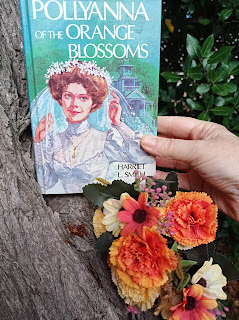
MY THOUGHTS:
Tragically, the beloved original author Eleanor H. Porter died of tuberculosis five years after the publication of Pollyanna Grows Up in 1915. Her two Pollyanna books had been selling so wonderfully well, the publishers knew when they were onto a good thing. They enlisted the help of Harriet Lummis Smith to take up the slack and keep the stories coming where Porter had left off. Smith made such a smooth transition of this one in 1924 that I love it as much as Porter's books, if not more.
It starts with a wedding and move to a tiny apartment in New York City. Jimmy gets a job with an engineering firm there, and he and Pollyanna are excited to be living in the Big Apple of the pre-WW1 era (not that they realise at the start that this is their point in history, of course). Young and inexperienced, they are winging it a bit, but course correction always sets in because they have what it takes to go the distance; genuine love and devotion for each other. Indeed, Smith makes this fabulous pair easy to cheer on. We are told, 'the rapture of their first nest making was one that could never be duplicated.'
Male dominance was rife in the early twentieth century. Pollyanna and her new neighbour, Judith, introduce themselves to each other as, 'Mrs James Pendleton' and 'Mrs Russell Thayer.' You can't get much more patriarchal than that. Women generally didn't aspire to work outside the home, and if they did it wasn't by choice, as we see through the plight of poor Lizzie, the single mother who did a spot of domestic cleaning to make ends meet. Although Judith sometimes bristles about being a drudge, Pollyanna loves the lifestyle. For her, their apartment is her creative canvas and being free to shape it all day is the gladdest thing ever.
I don't feel inclined to hiss and boo at the blokes though. They didn't have it easy, no doubt about that. Jimmy works 5.5 days a week! I was astonished to see him head off to the office on Saturday mornings to work half days and it set me googling. It seems the 40 hour work week with its two day weekend wasn't introduced until the 1940s, although forward-thinking Henry Ford had inaugurated it in his own factories way earlier. I feel our boy Jimmy was hard done by, although he and Pollyanna certainly never complained. They were delighted that he got to knock off at 1pm on Saturdays and have a free afternoon for city excursions. It's a lesson in perspective for me.
The story introduces the catastrophising, negatively-skewed Judith as a fun foil and contrast to Pollyanna. She makes mountains out of molehills, stores up grievances, sulks over supposed insults and slips into perpetual black moods. The big question is whether or not Judith can make a go of Pollyanna's glad game when she hears about it. It's fun seeing her put it to the test, because I've admittedly had my share of Judith moments. She comes to understand that a decisive attitude to enjoy life is ninety percent of the battle won.
I'm sure Porter would have been more than happy with the direction in which Smith took the characters she invented. Smith obviously immersed herself in Porter's two books and stays true to every single character. Aunt Polly is as imperious and austere as ever, and Jamie Carew, now an author, is still his touchy, high maintenance self. One of my favourite incidents in this novel occurs when Jamie and Sadie are expected for afternoon tea and Pollyanna and Jimmy must defuse a few household catastrophes in the lead-up.
World War One breaks into Jimmy and Pollyanna's domestic bliss, and I noticed just a touch of foreshadowing. Now I'm going to get a bit plot-spoilerish because it raises an interesting question. Read on if you dare.
Was it commendable for Pollyanna not to tell Jimmy she was pregnant before he answered the call of duty and sailed off to serve in France? The story leaves no doubt that we're supposed to take secrecy as a heroic sacrifice on her part, to make it easier for him to do his patriotic duty. Yet arguably, especially from a more modern perspective, he should have been told anyway! Pollyanna's spur-of-the-moment decision to keep her pregnancy secret from Jimmy is controlling and manipulative, however well-intended, because she denies him the possibility of response. They are co-parents and just because she carries the baby, he deserves not to be kept in the dark. I see both points of view, and I guess that because patriotic readers of 1924 who had recently come through the war were the target audience, we're being coerced to verge to their side and consider Pollyanna a great heroine for her silence.
Okay, spoiler over.
I feel we are in capable hands with Harriet Lummis Smith, and look forward to more Pollyanna tales from her. Next up will be Pollyanna's Jewels.
🌟🌟🌟🌟🌟
March 22, 2023
'Oliver Twist' by Charles Dickens
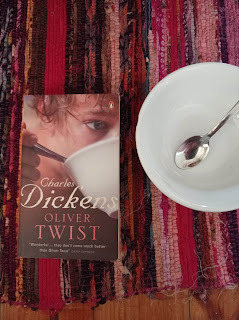
The story of Oliver Twist - orphaned, and set upon by evil and adversity from his first breath - shocked readers when it was published. After running away from the workhouse and pompous beadle Mr Bumble, Oliver finds himself lured into a den of thieves peopled by vivid and memorable characters - the Artful Dodger, vicious burglar Bill Sikes, his dog Bull's Eye, and prostitute Nancy, all watched over by cunning master-thief Fagin. Combining elements of Gothic Romance, the Newgate Novel and popular melodrama, Dickens created an entirely new kind of fiction, scathing in its indictment of a cruel society, and pervaded by an unforgettable sense of threat and mystery.
MY THOUGHTS:
I was left so gloomy and irritated by my recent reading of Dombey and Son that I didn't dare choose another of Dickens' less renowned books yet. I wanted to follow that facepalm with something certain to hit my sweet spot. What better than a scathing indictment of society that delighted the public enough to be taken on stage with a stellar musical score all of its own? Even my Year 7 class put on a great production of 'Oliver!' based on the 1968 film. I wasn't in it because I joined the school after the cast had already been chosen. That made me really sad, but I have strong memories of those days and decided it was high time I actually read the book.
Poor little Oliver's anonymous mother gives birth to him in a workhouse and dies. He's assigned a random name by Mr Bumble the Beadle (who is up to T for Twist) and thrown upon the hypocritical mercy of charity. Behind the scenes, Oliver's parents were, of course, real people with complex histories. But since nobody knows, he's treated like the dregs of society in an institution where inmates are exploited and starved.
Severely punished for his unprecedented nerve to ask for more gruel, Oliver is apprenticed to Mr Sowerberry the undertaker where he's bullied by cowardly fellow-apprentice, Noah Claypole. Finally Oliver trudges his own way to London, and becomes the oblivious target of creepy old Fagin and the gang of little boys he's training to become criminals. What's more, a vindictive face from Oliver's past (or rather, his parents' pasts) is out to get him. What chance does an innocent boy have with sneaky undesirables hemming him in from multiple directions?
Charles Dickens wasn't an old guy when he wrote this book. I think an image of the bearded, mature author of classics gets stuck in our heads. This was only his second book and he was 25 years old, surely still in touch with how young boys think. His wistful and sensitive Oliver, forever coming head on with the seamier side of society, is captivating and convincing. But so is the street-smart and super-precocious 'Artful Dodger' who carries off the slick mannerisms of a grown man in his too-big clothes; and his sidekick, the easily amused Charley (aka Master Bates!) The obnoxious, tough-talking Noah with the heart of a chicken is pretty memorable too.
But it impresses me even more that such a youthful Dickens conjured up with his pen such unforgettably shady characters from the underworld, including the villainous Monks, who would've been of a similar age to himself. And don't get me started on the infamous Bill Sikes with his serious anger management issues.
The sticky problem of Fagin became awkward for Dickens. Even though the young author was not writing for such a reactive woke culture as ours, he still faced shouts of 'Anti-Semitism' which apparently surprised him. But it's no wonder! I didn't count them, but it's clear that the rascal is referred to as 'the Jew' far more than his actual name. (My Google search reveals that in the first 38 chapters alone, Fagin is referred to as 'the Jew' 257 times, as opposed to a mere 42 for 'Fagin' and 'the old man' combined.) I believe Dickens re-issued a later edition where he weeded some out, but it was a case of too little, too late. That designation (the Jew) is bandied around so often it does merge with the villainy and repulsiveness of Fagin's character, which is sometimes likened to Satan himself. Especially how he creeps around like some hideous lizard from the gutter calling everyone, 'My dear.' And if you've seen the musical, do you remember him crooning to his young protėgės that they've 'got to pick a pocket or two'? The guy is so abhorrent, he's a legend.
About 25 years down the track when Dickens wrote Our Mutual Friend, he created Mr Riah, a noble-hearted hero of the Jewish faith. If that was an olive branch to make up for Fagin, I wonder if it worked.
Here, I believe, is the power that drives this story. Dickens reveals two parallel universes within one geographical location, Victorian London. There is the gentle, lovely respectable world inhabited by the likes of Mr Brownlow and the Maylies. This is heaven itself to Oliver, 'after the noise and turbulence in the midst of which he had always lived.' Juxtaposed against this is the harsh and sordid abyss of iniquity which is anathema to Oliver, but a trap for all who dip their toes in, however unwittingly. Dickens makes it clear that nobody can hope to hop over in an upward direction. Oliver, aged 11, is swallowed by the dark side, who refuse to relinquish him.
That is where the awesome Nancy, former girl pupil of Fagin's, steps in. There are strong hints that she's a prostitute, although Dickens never states it outright. This young woman feels that her own case is too far gone, but resolves to be a bridge for Oliver, whatever it may take. Whoa, she's earned herself the right to be the first heroine who springs to our collective minds whenever anyone mentions this book. Dickens loved the sweet and principled Rose Maylie. She was believed to be modeled on his own beloved sister-in-law Mary Hogarth, who passed away while he was writing it. Yet I'll bet the general public embrace the conflicted character of Nancy, that bad girl with her tragic brand of thief's honour.
I do love this book. It's up among my favourite Victorian novels, and only just slips in to the early end of that era too. It was first published in monthly installments between February 1837, the year Victoria ascended the throne, and April 1839. The cops who pound on the derelict warehouse door toward the end of the story demand the gang to, 'Open up, in the name of the King.' They're evidently referring to King William IV, who died in 1837. So although Oliver the book squeezes into the Victorian era, Oliver the story pre-dates it just a little.
I guess it set a high bar for all Victorian novels yet to come. It's so satisfying when Oliver finally gets a break. How much horror can one young boy take? The astounding coincidences we're bombarded with at the end are all part of the fun. Dickens could probably get away with them then because the magazine subscribers he was writing for relished that neat sense of loose ends being tied up. And he gets away with them now because he's Dickens and that's his trademark.
If I'd been a reader from that time period, I would've echoed right back at Dickens the iconic words of his title character. 'Please sir, I want some more.'
🌟🌟🌟🌟🌟
March 15, 2023
'The Grapes of Wrath' by John Steinbeck (Chapters 16 - 30)
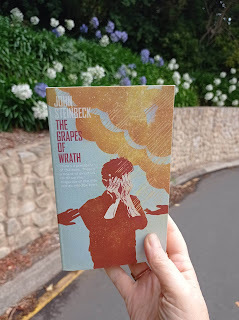
Warning: Spoilers. We're discussing Part 2.
'Okie used to mean you was from Oklahoma. Now it means you're a dirty son-of-a-bitch.'
Whew, this second half of the novel is the disillusioning section in which the Joad family realise that they, among thousands of others, are victims of callous, widespread exploitation. Fobbed off in their home state to seek work in California, they discover their golden destination is an inhospitable zone where they are taken advantage of by greedy landowners and despised by the general population, who resent their willingness to work for a pittance. Employers collude with police and bank sharks to keep workers from the Dust Bowl destitute and ripped off.
The gut-wrenching quality of Steinbeck's writing is that we all know but for being born in a different place and time, we could be the Joads. Which of us has never been shunted from one government department to another, seeking resolution of our issues from people who don't really care? Here we have the most extreme example, leading to wholesale homelessness and starvation for thousands. The nation of America has let down its precious citizens, and Steinbeck aims to make sure everyone knows it.
I feel we can't help but appreciate his main character Tom, that master of straight-talk. He's rough around the edges, to say the least, but his refusal to sugarcoat his insights is good for those at the receiving end. Tom zooms directly in on people's blind spots and tells them pointed home truths they'd be wise to take on board. Whether it's the one-eyed chap at the used car yard (clean up your act, make the best of things and move on) or his own spiky, defensive younger brother ('Goddamn it Al, don't keep your guard up when nobody ain't sparrin' with ya'), Tom gets to the crux. His social conscience is fired up by the end of the novel to do his utmost for downtrodden victims of a corrupt system. Even his mother recognises that he's different from the others, in his burgeoning passion for social justice. 'Everythin' you do is more'n you.'
Tom's dilemma may well form the heart of the novel. He knows he's breaking his parole conditions by moving out of Oklahoma but figures that if he keeps his nose clean and doesn't get into trouble with the law, nobody will ever be any the wiser. Yet alas, it's not that simple. Tom never anticipates the possibility that the agents of law themselves may be upholding something that's rotten to the core. It turns out holding his peace will be incompatible with holding his head high as a decent man. To avoid his own soul being tainted by the corruption at large, Tom must risk his personal safety by making waves.
I'm touched by the spiritual hunger in the collective human heart. That other concerned humanitarian soul, Jim Casy, keeps reminding people that he's no longer a preacher, yet they still keep requesting words of prayer, benedictions and blessings. And Casy realises that providing what they ask for is neither hypocritical nor pretentious as he feared, but the humane thing to do. Saying a brief, heartfelt prayer is benevolent balm for those who crave comfort and meaning for their plight, which is almost everyone they come across. And arguably, that craving wouldn't be in the human heart if there was no means of fulfilling it.
We don't even know what becomes of the Joads at the end. The desperate travel saga involves members of the family being picked off one by one for whatever reason, whether death, choice or necessity. Ma Joad is determined to be the glue that holds the family together, but her will is no match for eroding circumstances. They leave Oklahoma with 13 people on the truck, which is whittled down to just six by the end. Those they lose include Tom and Al, the only two drivers. The weather is turning wintry, which means nobody will hire workers at all for the next six months or so. So what happens to the half dozen left (not to mention those who have gone) is anyone's guess.
All power to the Joad kids. Let's hope Noah settles down to make a simple but satisfactory life for himself by the Colorado River. And that Tom will dig into latent leadership genius to make an effective difference for his people. And that Rose of Sharon will continue to muster the heart of maternal compassion she uses in the final scene of the story to nurture those who need it. (My heart goes out to this girl. I don't think she was 'whinin' around candyin' herself', as Ma expresses, considering she was pregnant, nauseous, transient, starving, and her husband had just taken off and left her.)
Let's hope that Al settles down to become a solid and reliable family head himself, and realises he has nothing to prove. And that the day will come when Winfield decides he's had a gutful of Ruthie using him as her prop to big-note herself into believing she's cool and cocky. Also that Ruthie herself realises a gentler, more generous approach may see her better through life. These two youngest Joads are an interesting little pair.
Above all, let's hope a day will come when the family needn't wonder where their next bite of food is coming from.
Have I changed my opinion about this book from the time I loathed it as a school text? Heck yes! This is clearly a fantastic epic that served a noble purpose and deserves nothing less than five stars. Ma tells both Al and Rose of Sharon on separate occasions that they're too young to really 'get it.' I think the same thing applied to me as a 17-year-old English student. This far down the track, the whole thing moves my middle-aged heart. The image that remains with me is that of Uncle John launching Rose of Sharon's stillborn baby down the flooded river in an apple crate, to speak powerfully and silently for his people like a little dead Moses.
See here for Part 1 (Chapters 1-15)
🌟🌟🌟🌟🌟
March 8, 2023
Agatha Christie Mysteries
Sad Cypress (Hercule Poirot mystery 1933)
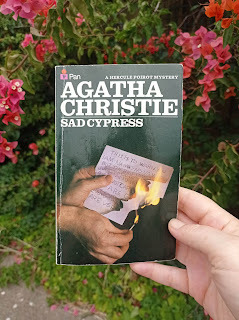
It seems such a clear case against the accused, the court is only going through the motions of a hearing. Twenty-something Elinor Carlisle is accused of murdering golden-haired, angelic Mary Gerrard. Apparently she did it in the guise of hospitality with a plate of poisoned fish paste sandwiches. Elinor was known to have been bitterly jealous of Mary. Not only was Mary supposedly 'sucking up' to Elinor's invalid Aunt Laura with the intent to steal Elinor's inheritance, but she attracted the love of Roddy Welman, Elinor's own adored fiancē.
Mary comes across as so beautiful and well-liked, it seems impossible that anyone else could have either a motive for murder or access to that plate of sandwiches. That is, until Hercule Poirot gets involved in the case.
This is one of those mysteries that goes back years before either Elinor or Mary were born. But on the surface, poor Elinor appears outside windows like a vulture, overhearing Mary's vulnerable moments.
Poirot, being his usual smug self, brags how everyone he interviews helps him out by telling lies, some well-intended. And the lies people tell are sometimes more revealing to him than the truth. I like how the little Belgian detective is described as 'Londonified' after one trip to the big city.
Some of my favourite lines include Dr. Peter Lord, Elinor's admirer, telling Poirot, 'She has the bad taste to prefer a long-nosed, supercilious ass with a face like a melancholy horse,' and Poirot solemnly acknowledging who he means.
Poirot can get philosophical at times.
Roddy: Why should these things happen to one? It's not as though one wished them to happen! It is contrary to all - to all one's ordered expectations of life.
Poirot: Ah, but life is like that. It does not permit you to arrange and order it as you will. It will not permit you to escape emotion, to live by the intellect and by reason. You cannot say, "I will feel so much, and no more." Life, Mr. Welman, whatever else it is, is not reasonable.
Roddy: So it seems.
I'm glad the rat who did it didn't escape justice. But how terrible that such an audacious murder happened at all, to someone innocent of all the undercurrents, with her whole life ahead of her.
🌟🌟🌟
The Moving Finger (Miss Marple mystery 1942)
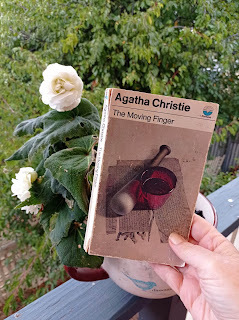
A young man named Jerry Burton is ordered by his doctor to recuperate in the country after a light plane crash. His sister Joanna is going with him and they've rented a cottage called Little Furze in an idyllic village named Lymstock. Little do Jerry and Joanna realise the town is being plagued by an anonymous letter writer with some axe to grind. Before long they receive their own vicious epistle, with loads of venom but no substance.
The letters are merely a nuisance to most, and initially a joke to the Burtons. But when a poor local woman commits suicide after reading what's arrived in the post, everyone decides 'Poison Pen' has gone too far. It's become a matter for the police.
Technically, this is a Jane Marple mystery, although our spinster sleuth is more of a bit player, only present in the last 40 pages. What she does is awesome just the same. She even trumps Inspector Graves, the expert in anonymous letter cases called in from London. Miss Marple's modest rationale for her brilliance is, 'One sees a good deal of human nature in a village.'
This novel is quite a psychological study. The letter writer comes across as one disgruntled, cheesed off individual who wants to lash out at the whole human race, for whatever reason. They've been called, 'dangerous as a rattle-snake, a cobra and a black mamba rolled into one.' Then there's the first victim's frame of mind to consider. Did she find the letter's content struck too close to home? The vicar's wife suggests, 'If suicide is your idea of escape from trouble, then it doesn't very much matter what the trouble is.'
My other observations deviate from the mystery to the time period. Jerry and Joanna's elderly landlord, Miss Emily Barton, decides to take her tenants' heavy smoking in her stride, because 'everyone does it.' She says, 'I'm afraid I haven't moved with the times... The only thing is there are no ashtrays in the house.' Joanna cheerfully offers to bring lots of their own, and promises, 'We won't put cigarette ends down on your nice furniture. Even I can't stand that.'
Oh, poor Miss Emily, the smoking would be a deal-breaker for me. Imagine the atmosphere in her home once their lease expires.
Then there's the interesting introduction of Jerry's favourite work of art, 'Old Man enjoying the pleasures of idleness.' He fetches it to show the doctor's sister, Aimee Griffith, who breezes around urging others to be industrious. Jerry points out that we owe lots of famous inventions to idleness. Our boy turns out to be a great spokesman for the limitations of the Protestant Work Ethic at its extreme.
Oh, and romance is rife, even in a poky town with lots of unpleasant crime. By the end, both Jerry and Joanna have found the loves of their lives. I read this one in just a few sittings. Couldn't help it. There are so many possible suspects, each with interesting back-stories that just might push them over the edge.
🌟🌟🌟🌟
March 1, 2023
Mini Reviews
Kingfishers Catch Fire by Rumer Godden
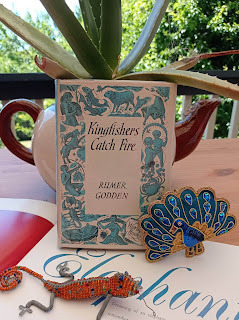
This old Rumer Godden title from the 50s was a secondhand shop discovery. It's about a single mother named Sophie who takes her two young kids to live in Kashmir, India. Sophie is idealistic and rosy eyed about living like peasants. She glorifies being poor and has a heavy-handed approach, assuming she can just lob there and fling on another culture like a change of clothes. Her young caretaker, Nabir Dar, often bears the brunt of her naivety.
Sophie reminds me of some hardcore fellow homeschooling parents I met over the years. She thinks she's providing her children an awesome, hands-on unit lesson lifestyle, but she's a source of stress to her young daughter, Teresa, who is a practical little worry-wort.
Sophie sees herself as sparing and aesthetic while her neighbors think she's lavish and fancy. And she falls into the error of assuming her western ways are superior and trying to foist them on everyone else. She even unwittingly becomes a quack, setting up her own herbal distillery. I couldn't help but imagine her speaking in an annoying, know-it-all voice.
The action builds up to a climax, possibly inevitable with two clashing outlooks. Godden herself lived in India for many years from her childhood and understood both sides if anyone could. Her bottom line is that some people can't bend out of their shape and trying to do so for the sake of pleasing other people to fit in never does anyone any good.
'Be true to yourself,' may sound like a trite, overused theme, but Godden really threshes it out and makes us think.
Are you a fan of this 20th century British author? Have you come across this title? I never had. She was a prolific author. Not one of her best known, but I doubt she wrote anything bad.
🌟🌟🌟½
To Say Nothing of the Dog by Connie Willis
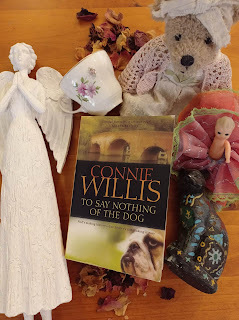
Who's for some sci-fi time travel set in the Victorian era?
I hadn't heard of Hugo and Nebula Award winning author Connie Willis before. But my friend and fellow creative writing student Brian lent me this book, and it was compelling and hilarious.
The hero Ned Henry is a time-travelling Oxford student who's part of a team attempting to reconstruct the Coventry Cathedral, which was blitzed in WW2. He's sent to track down a crucial artifact from the Victorian era, and suffers the age-old time travel dilemma of potentially stuffing up circumstances to create major incongruities.
I love it that two animal character, Cyril the bulldog and Princess Arjumand the cat, have pivotal roles. And woven through is a comforting notion that circumstances have a way of veering back on track themselves, despite clueless blunders by visitors from the future.
Ned has a fun encounter with Jerome K Jerome and Co. while they're actually living their adventures later recorded in The Men in a Boat. Connie Willis is full of historical detail and must have an almanac for a mind.
Unlike many other readers, I think the hideous Bishop's Bird Stump, at the heart of the tale, sounds quite cool. Call me tacky but there you have it. Those over-detailed, mawkish Victorian relics from the past are quite endearing. The monstrosities to which it's compared (Prince Albert Memorial and St Pancras Station) are fine, come on!
Lucky for Ned, the idyllic Victorian era he finds himself in is not that which is represented in Dickens poverty ridden sections of seamy London. It includes, 'long dreamy afternoons boating on the Thames and playing croquet on Emerald lawns with girls in white frocks and fluttering hair ribbons. And tea served under willow trees by bowing butlers anxious to cater to one's every whim.'
Have you read any Connie Willis? Are you fascinated by the Victorian era as I am?
🌟🌟🌟🌟
How Green Was My Valley by Richard Llewellyn
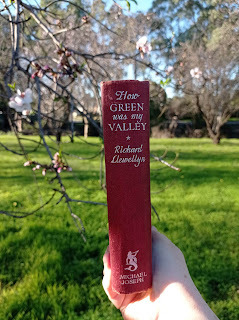
'To have pens and pencils, and the tools of writing all your own, to see and feel them in your fingers ready to do anything you tell them, such is pleasure indeed. God bless the craftsmen who give their fellow men such feelings, even out of pieces of wood.'
I found this old book at a secondhand shop. It was published in 1939 and became the bestselling fiction tile of 1940 throughout America and probably the rest of the world. People just couldn't get enough of it. Having now read it, it is a pretty special story.
It's a tale of coal miners living in a remote Welsh community, narrated by a smart boy named Huw Morgan (pronounced Hugh). He says so many appreciative, philosophical nerdy comments without ever once feeling ashamed or apologetic before his peers. ('A good friend of mine is a cup of tea indeed.') And he never big-notes himself, yet his personal narrative still has the effect of making us cheer him on, 'Yeah, you go, boy.'
His was a background of unrest, union strikes, and harsh local justice delivered at the hands of Mr Gruffyd, the pastor, with his 'eye for an eye' logic. And it's worth reading just for the hilarious discussion about the birds and the bees between Gruffyd and Huw, who genuinely has no idea. It's so cringeworthy and hilarious. (And he figures it out on his own soon enough.)
All through, the singing seems to soar out of the pages as the gift from God it probably was.
Here's one more reflection from Huw, after unfair corporal punishment at school. 'Pain is a good cleanser of the mind and therefore of the sight. Matters which seem to mean the world in health are found to be of no import when pain is hard upon you.'
Have you read, How Green was my Valley?
🌟🌟🌟🌟½
The Rosemary Tree by Elizabeth Goudge
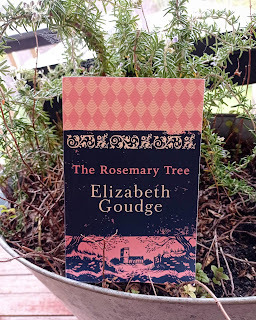
'A room takes the stamp of its owner as helplessly and surely as soft wax.'
Although ours is more of a rosemary pot and nothing as lavish as a tree, it's lovely and fragrant ☺️
I've just finished this next Elizabeth Goudge novel from my shelf. This one is a post-war village tale set in the 1950s and featuring many characters. They include Michael, a former bestselling author of horror stories who has served a jail term; John, the self-deprecating pastor and Daphne, his restless wife who hardly knows what she's seeking.
Goudge writes weirdly, and I mean that in the most complimentary way. She has introspection in the strangest places, info-dumps of backstory galore, head-hopping like rabbits and meditations that come across as gross overreactions. I doubt anybody would write like this anymore because it upsets too many literary conventions, aka sacred cows. Yet there's just something special about it.
Hers are sacramental, mystical sorts of novels and I'll keep reading them even though they're surely not everyone's cup of tea, or even mine in the wrong mood.
However, if you have a commonplace book to fill with quotes, her novels are just the thing to fill them thick and fast. I expected more thoughts to ponder and she didn't let me down.
Have you a favourite Elizabeth Goudge novel? I think mine is still The White Witch so far.
🌟🌟🌟½
February 26, 2023
'The Grapes of Wrath' by John Steinbeck (Chapters 1 - 15)
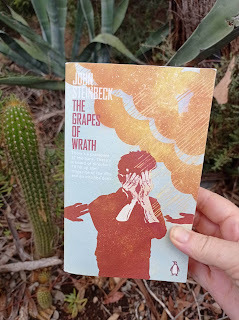
First published in 1939, Steinbeck’s Pulitzer Prize-winning epic of the Great Depression chronicles the Dust Bowl migration of the 1930s and tells the story of one Oklahoma farm family, the Joads—driven from their homestead and forced to travel west to the promised land of California.
MY THOUGHTS:
Long ago, I had to study this book for Year 12 English, and decided it was depressing, emotionally scarring and the absolute pits. But several reader friends have loved it. It won Steinbeck the Pulitzer prize in 1940 and struck such a nerve in America, laws for down-and-out laborers ended up being changed. It was also the bestselling fiction title in America in 1939. These are all excellent reasons to put aside my teenage prejudice and re-read it.
Here is some background. During the great Depression when central USA was an unproductive dust bowl, thousands of tenant farmers were forced off their land by landowners and urged to head further west for work instead. It turned out to be a callous way of passing the buck, since conditions in California were equally deplorable and desperate folk had nowhere to turn. Steinbeck interviewed some of these laborers for a series of articles, and their plight incensed him enough to write this classic novel on their behalf. His was the Voice for those who had no voice, and what an eloquently pissed-off voice it was!
Tom Joad is a 30-year-old jailbird who has just been released on parole. On his way home he meets his old preacher, Jim Casy, who has quit preaching because of habits he couldn't control. (Such as having sex with his female followers. Fair call, Casy.) The two men find Tom's old family home derelict and deserted, and track down the Joad family in the nick of time. They've been forced to join the mass exodus moving west to California, which they have every reason to believe flows with orange juice, wine and jobs for all seekers. So Tom and Casy decide to hop aboard the family truck, although technically the conditions of Tom's parole restrict him from travelling out of his own state.
This first section deals with the desolate dust bowl of Oklahoma, full of its own austere beauty, and takes the Joads on the first leg of their trip west. They are a mixed bag we grow to care for. Steinbeck's trademark style is a microscopic way of zooming in on the minutiae of people's facial features and clothing. It seems to work really well for him, shining a spotlight on their characters. He had a knack of intuitively knowing which apparently inconsequential details to mention. That approach doesn't work for every author.
So we have Grampa and Granma, a feisty duo who are beginning to lose the plot a bit; and their two sons, whiskered Pa and anxious Uncle John, who turned hypochondriac after his wife's tragic appendicitis death which he'd brushed off as a stomachache.
The younger generation begins with Noah the plodding firstborn, who still gives the impression of being misshapen after a panicked delivery by Pa. Next is straight-talking Tom himself, then newly pregnant Rose of Sharon (called Rosasharn) whose 19-year-old hubby Connie is also along for the ride. This young man gives the impression of being a bit dreamy and not good for much hands-on stuff other than fathering babies. Fourth Joad kid is 16-year-old Al with his handsome face, raging hormones and mechanical know-how of which he's very proud. Al regards his brother Tom with pride, rather than shame, for having killed a guy. Finally there are the two youngest, scrappy Ruthie and secretly sensitive Winfield, who are 12 and 10.
But caring for all is Ma, the family thermometer and cornerstone. We are told her husband and kids only admit to hurt and fear if she acknowledges them first. 'And since when a joyful thing happened, they looked to her to see whether joy was on her, it was her habit to build laughter out of inadequate material.' She's regarded as one of the great mothers of literary fiction.
Great insights from characters flow thick and fast, especially from Casy the ex-preacher, who loves to quietly take himself aside to simply sit and think things through. His insight can be simple. I can't say no grace like I use ta say. I'm glad o' the holiness of breakfast. I'm glad there's love here. That's all.'
But my favourite so far is this exchange between Ma and young Al, while she sits beside him as he drives. I'm convinced some of the best conversations happen from the cockpit of a vehicle.
Al: Ain't you thinkin' what's it gonna be like when we get there? Ain't you scared it won't be nice like we thought?
Ma: No! No, I ain't. You can't do that. I can't do that. It's too much - livin' too many lives. Up ahead they's a thousan' lives we might live, but when it comes it'll o'ny be one. If I go ahead on all of 'em, it's too much. You got to live ahead 'cause you're so young, but it's just the road goin' by for me. An' it's just how soon they gonna want to eat some more pork bones.
I've got to say, I'm enjoying it thus far. I'm looking forward to wrapping up with the next section, although not so much the rude awakening which surely awaits the hopeful and resourceful Joad family. Stick around for Part Two, Chapters 16 to 30.
February 22, 2023
Drawbacks and Benefits of Bookstagram

Bookstagram is simply the corner of Instagram where bookworms run rife, sharing reviews, photos and other bookish content. I joined back on New Year's Day, 2017, having been told that's where all the action is. After six years and almost 800 posts on that platform, I'll put in my honest two cents worth on whether it's all it's cracked up to be in my experience. I'll begin with the many drawbacks and finish off with the benefits that keep me hanging in there.
DRAWBACKS
* You're a minnow in the ocean. The sheer number of Bookstagram accounts is overwhelming and the platform has its share of polished, impressive creative 'Influencers' the same as any other. Your voice is quickly smothered in the tidal wave of bookish content. I'm sure many new bookstagrammers wonder where all these trillions of like minds were back in the day when we found ourselves to be lonely book nerds at school and parties.
* Bookstagram is a poor platform for promoting lesser-known books. These tend to slide under the radar and receive a smattering of likes and very few comments, if any. I'm not sure whether this is because people simply scroll past books they don't recognise or because the instagram algorithms favour bestsellers which the majority are raving about anyway. It sometimes seems we have a choice between either highlighting unfamiliar books and being ignored, or talking about the same old stuff for a bit of engagement.
* Joining Bookstagram will not attract readers to your blog. That's not how bookstagrammers roll. The reason for scrolling instagram is to maximise exposure to as many pretty book pictures and quick brain snacks as possible in the given block of time we've set aside. It's not for getting sidetracked by visiting fellow bookstagrammers' blogs. In other words, when we're seeking fast food, we're rarely tempted by the prospect of a more substantial, sit-down meal. I can attest to that. Often when several people have liked and commented on my instagram posts, blog page views remain static. There are occasional rare souls who make a decision to return and read the post later. Those are the lifeblood of blogs.
* Not only your own number of followers but everyone else's is always in your face. Since the platform itself is built to place a great significance on numbers, it takes a strong mind to ignore all of that. I know several of us claim we do ignore it, but do we really, when that figure is forever in our face like a big red nose? You may ask, 'Hey, how come this person has been on for a shorter time than me, but already has triple the number of followers?' If this type of question plays on your mind, it might not be worth being on the platform, for it has the tendency to become toxic. And pretending we aren't bothered if we really are is disingenuous and exhausting.
* Your numbers are not necessarily even accurate. That rising numeral that gives us the warm fuzzies may be distorted by bots, randoms with their own reasons for following all and sundry, and former legitimate bookstagrammers who have abandoned their accounts and left them hanging in cyberspace. A bookstagrammer I know in real life remarked how although she apparently has 3000+ followers, it's always the same twenty or thirty people who engage her with comments. I can say something similar, although my total number is less than hers.
It's sort of ridiculous to be proud of a delusion.
* Opportunities for distractions and tangents are rife. Some bookstagrammers set up their stories with all sorts of fancy questionnaires, graphs and gimmicks, because that's what we believe will attract new followers. And perhaps it does. The more eager engagers out there may know better than me. Others may set up reels of people turning the pages of a book or pulling spines off library shelves. I don't totally get the appeal of reels when it comes to Bookstagram. Unless the illustrations are mind-blowing, why watch other people turning pages rather than turning our own? Some bookstagrammers try to win allegiance by holding competitions. I'd like a dollar for every time I've read the instructions, 'Follow me, tag at least three friends to follow me, don't follow and then unfollow.' Seriously, I'd rather people unfollow me than remain grudging followers. My bookstagram account is not a mouse trap, nor is it the Hotel California! If you're not stimulated by my content, then cheerio. But I never hold competitions anyway. My point is that all this hoo-hah and hoop jumping is time consuming. It detracts from the time we have to read books, which is, after all, the ultimate reason for joining Bookstagram.
* Grief over losing good friends can be sudden and real. On several occasions, great accounts I've followed have simply pulled the plug and disappeared. Or else they've lost their momentum and left their feed sitting there, unrenewed for year after year. And often we never hear a word of explanation. People have a right to leave instagram, but it's a reminder for those of us left behind that bookstagram friends are not quite the same calibre as IRL friends, however much we may value them. Other times, good friends may stop liking and commenting on our posts simply because they are no longer appearing in their feed. Algorithms change, and we can be the victims. Other than visiting and commenting on theirs to remind them that we're still here, there's nothing much we can do. And all the second guessing can do our heads in.
* Sometimes we may feel obligated to join in when we're tagged, either on a story or a general post. Conversely, we may feel miffed if we're not technically tagged, and wonder whether we ought to just jump in anyway. (The answer is heck yeah!) Both scenarios have the potential to cause us a bit of anxiety we would not otherwise have experienced.
* FOMO is real. You're bound to come across occasional raving booksta posts about how a couple of friends of yours got together behind the scenes to 'buddy read' one of your favourite books, and you weren't ever told. Do you relish the opportunity to revert back to your most insecure, miserable High School feelings, even when you're middle aged? Bookstagram has the potential to bring back the saddest, most forgettable memories of our adolescence. But only if we let it. In many cases, bookstagrammers make an effort not to be cliquey by asking people to join their read-alongs. The more the better.
BENEFITS
* You're a minnow in the ocean. This is the flip side of the first drawback. Something liberating happens when we realise we needn't take ourselves too seriously. We're doing nothing that hasn't been extremely well done by thousands and thousands of others. This frees us to take risks and be real in our thoughts and discussions, because nobody is really watching us.
* We learn about many great books we've never heard about before. I've been immersing myself in the world of books since I was very small, and thought I'd come across most old treasures that might tick my boxes. Was I ever wrong! I have many bookstagram friends to thank for introducing me on different occasions to delightful novels I never knew existed. Thanks heavens for those brave bookstagrammers who ignore the second point on my list of drawbacks, and rave on about lesser known books anyway. And I've been able to pass it forward to others. The same goes for challenges. I'd never have known about the annual readers' challenge on the Agatha Christie website if I hadn't seen several other bookstagrammers mention it. Or the weekly Jane Austen and Lucy Maud Montgomery challenges I jump into when the mood strikes me.
* It's a screen for new releases. There is so much media hype surrounding hot-off-the-press books, I enjoy settling back to see what trusted friends have to say about their first impressions. Depending on the overall effect, I might either rush to get hold of a copy of my own, or decide to forget it, at least for now. There are too many books in the world to read without getting swept along in the crowd, and finding we're not impressed. I don't know for sure, but I imagine I've been warned to steer clear of several rabbit holes.
* We have a record for our own benefit, and quite an attractive one. I avoided bookstagram for a long time, thinking I could never live up to the visually superior standards that had been set by others. However, making an effort to frame a book with a lovely background has helped to open my eyes to beauty of the world around me, whether it's the great outdoors or props in my own home. It needn't even be about the photos of all. I've come across several great bookstagrammers who use the same white or paisley backgrounds all the time.
* We can indulge our love of specific books. Whether it's Wuthering Heights, Middlemarch, Harry Potter or the Narnia Chronicles, just explore the hashtags to get hours of fun reading what tons of other fans think of the book. This could even form your silent reading on any lazy evening when you want to cheer yourself up. You might get a deluge of criticism too, but that's all part of the fun, and it's not such a bad exercise to see what the critics think. (We can do the same thing by scrolling reviews on Goodreads and Amazon of course, but without the benefit of the pretty pictures.)
* There is far more interaction than I get from doing my blog alone. I always condense my thoughts for bookstagram from reviews I've typed for my blog. And yet the discussion it generates is always far greater than blog comments. I've honestly come to a point where I don't mind few comments, but I relish that boost of dopamine. I'm not going to play coy and pretend I can take friendly engagement or leave it. Let's be honest, it's disheartening to feel we're always typing into a vacuum. Passionate chatter is lifeblood to a bookworm. Bookstagram, in my experience, is where the bulk of this fun comes from. And it's time to ditch comparisons. Even if I'm not getting as much engagement as other bookstagrammers who spring to mind, at least I'm getting far more than I ever would from this blog alone.
So I'm sticking to my little corner of instagram, at least for now. We'll be alright as long as we don't get bogged down in unanswerable questions such as, 'How come I got so much engagement for my post about Pride and Prejudice and hardly any for Persuasion, when I put in so much time and effort?' Perhaps the answer is that Bookstagram, being a little microcosm of life, mirrors the unpredictability of life.
Are you on there? Let me know and I'll follow you? And please follow me, @vincereview, if you care to.
February 15, 2023
'Rules of Civility' by Amor Towles
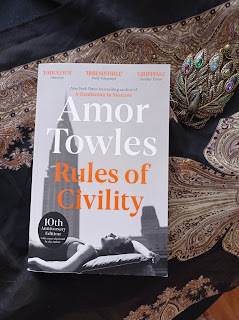
This sophisticated and entertaining first novel presents the story of a young woman whose life is on the brink of transformation. On the last night of 1937, twenty-five-year-old Katey Kontent is in a second-rate Greenwich Village jazz bar when Tinker Grey, a handsome banker, happens to sit down at the neighboring table. This chance encounter and its startling consequences propel Katey on a year-long journey into the upper echelons of New York society—where she will have little to rely upon other than a bracing wit and her own brand of cool nerve. With its sparkling depiction of New York’s social strata, its intricate imagery and themes, and its immensely appealing characters, Rules of Civility won the hearts of readers and critics alike.
MY THOUGHTS:
This was almost a DNF because for several pages it appeared nothing was going to happen other than social climbers drinking cocktails and attending musical events. But somewhere around the halfway point the story started to get interesting.
Katey Kontent is the working class daughter of a deceased Russian migrant. She and her room mate, Eve Ross, make a new friend on New Year's Eve, 1937. It's Theodore, aka Tinker Grey, who they assume from his prosperous appearance is a WASP boy (white Anglo Saxon Protestant). Pushy Eve instantly dibs Tinker for herself, attracted by his vibes of old family power and influence. Although Tinker himself seems to prefer Katey, Eve's talons are long and circumstances seem to flow her way. Yet down the track, when favour begins to shine on Katey, she has a gob-smacking revelation about Tinker that may change everything.
Okay, enough about the plot. The most awesome factors of this story are its era (covering the entirety of 1938) and its setting (New York City, the Big Apple itself). Amor Towles' writing is so colourful and evocative, it wouldn't surprise me to discover he'd been a time traveller! For a novel written in the 21st century, it's convincingly retro and full of 80-year-old glamour.
The main character herself is very cool. Katey is a bookworm who devours fiction, which stands her in good stead to read a room, assess people's character and wriggle smoothly into higher social echelons than her own. My favourite passages contain her occasional bookish thoughts lapsing into personal philosophy. For example, her dad knew that whatever life might throw at him, he'd make it through as long as he could appreciate something as simple and readily available as his morning cup of coffee. And it dawns on Katey that for her, his coffee translates to the works of Charles Dickens.
'Admittedly there's something a little annoying about all those plucky underprivileged kids and the aptly named agents of villainy. But I've come to realize that however blue my circumstances, if after finishing a chapter of a Dickens novel I feel a miss-my-stop-on-the-train sort of compulsion to read on, then everything is probably going to be just fine.'
Then down the track, she figures out why binge-reading Agatha Christie mysteries is more than just a lazy indulgence.
'You can make what claims you will about the psychological nuance of Proust or the narrative scope of Tolstoy, but you can't argue that Mrs Christie fails to please. Her books are tremendously satisfying. Yes, they've formulaic. But she doles out her little surprises at the carefully calibrated pace of a nanny dispensing sweets to the children in her care.... Poirot and Marple are not really central characters in the traditional sense. They are simply the agencies of intricate moral equilibrium that was established by the Primary Mover at the dawn of time.'
It's hard, at first, to muster much love for any character other than Katey herself; especially not that callous and selfish Eve or pliable and duplicitous Tinker (although admittedly his may be the best character arc). The sweet and privileged Wallace Wolcott has some great moments, as does Tinker's obnoxiously principled brother, Hank.
Yet near the finish it dawns on me the cast are living out a universal drama. We are prodded to question whether it's truly corrupt for struggling have-nots to make questionable decisions simply to place them on a level playing field with those spotless beings favoured by fortune. The distinction between the families of 'old wealth' and self-made folk who have had to be unscrupulously inventive to place themselves in the same social circles is fascinating.
Is the climbing and striving worth it though? We are left to figure that out for ourselves, and each reader's answer may be different. Tinker's apparently simple line, when he decides to give up the chase, may be one of my most profound picks. Inspired by Katey to read Thoreau's Walden, he says, 'All this wanting and not wanting. It's worn me out and for once I'm going to try the present on for size.' Since the 21st century has become no easier an era in which to live, I do understand where he's coming from.
Oh, and the way in which young George Washington's almost 300 year-old 'rules of civility' influence the course of Tinker's life has great bearing on the title, and we get the benefit of all 110 in a glossary at the back.
It's rare for a book I almost dropped to end up with four stars, but I love it when it happens.
🌟🌟🌟🌟
February 8, 2023
'Pollyanna Grows Up' by Eleanor H. Porter
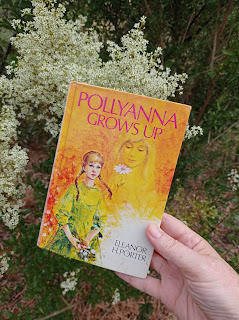
The sequel to Pollyanna finds the effervescent orphan on the verge of womanhood.
Her crippled legs cured, Pollyanna takes her glad heart to cheer new friends in Boston before travelling to Europe with Aunt Polly and Dr Chilton. But growing up brings sorrows as well as joys, and when she returns after six years, with Dr Chilton dead and Aunt Polly fallen on hard times, even Pollyanna has trouble maintaining her usual cheerful outlook.
MY THOUGHTS:
This is an entertaining sequel to 'Pollyanna', which starts soon after the conclusion. She is sent to stay with Mrs Ruth Carew, a lady suffering deep depression because over a decade earlier, her beloved baby nephew was kidnapped from the family by his eccentric father. Even though Ruth's brother-in-law has probably passed away, little Jamie's whereabouts remains unknown. These days he'd be on the missing person files. Ruth can't bear the uncertainty of not knowing whether he's suffering, or even dead. It casts a horrible shadow over every day of her life.
There in Boston, Pollyanna continues her habit of accidentally helping people transform their lives, including Jamie, a smart, bookish boy in a wheelchair, who might even be Mrs Carew's lost nephew, since he's unsure of his parentage and has the right name. Although Jamie plays his own version of Pollyanna's 'Game', he's not half as good at it as she is. It's possibly because he seems to have the typecast despondent, creative temperament of a literary author; the very thing he aspires to be. Jamie is a yearning, idealistic character we can't help liking. By the time Pollyanna leaves Boston, shes's helped bring several disparate, hurting people together, just by being herself and stepping out where more cautious and unsociable people would fear to tread.
In this first half, Pollyanna discovers that living in a big city is way different from living in a small town, and people are far more aloof than she'd like. And at last she learns that approaching strangers isn't always commendable.
The second half shoots forward six years. Pollyanna is twenty years old, returning to Beldingsville with her aunt after living abroad. Aunt Polly is now a widow who has fallen on hard times. To say she's reverted back to her bitter, cantankerous old self is an understatement. She's such a grinch, she even wants to cancel Christmas. Polly's brief taste of happiness seems to have made her crabbier than ever. Sadly, she only gets to spend a few years of marital bliss with her beloved Dr Thomas Chilton before he passes away, which understandably upsets many readers who enjoyed their whirlwind, second chance courtship. All we're told is that he 'died suddenly' and the text leaves us no idea why. I think it's safe to assume that Dr Chilton dies of a fatal case of plot device.
The stage is set for Pollyanna to introduce old and new friends in their time of need. She and her aunt must earn money fast while the Carew family are seeking a boarding house in country Vermont. Offering to host them herself seems a logical thing to do, although it unleashes all sorts of lovers' tangles and mix-ups. There are so many romantic assumptions that are way off track, if not outright bizarre, while it's probably predictable to every reader how the three key couples will end up being paired off.
The strained dynamics between Jamie and Jimmy are quite fascinating here. Both young men battle with jealousy of the other. I think Jimmy gets over his, especially when he discovers how unfounded it is regarding one crucial point. But for Jamie, I have the impression the green eyed monster is still raging, though concealed. Jimmy has so much he covets, including an able body and a budding career in engineering. And one more thing comes to light which would surely tip Jamie over the edge, if only he knew. I'm hooked on finding out how (if) that thread will develop in later books.
Pollyanna turns out to be a very dutiful girl, who will defer to her elders when it comes to choosing a spouse. It's a dated outlook (thankfully), which I doubt modern young readers would go for or understand. She ends up with the man her heart chooses, but only after clearing it with Aunt Polly, then Uncle John first! Pollyanna ends up with the perfect guy for her, and in her place, I would have been tempted to rub it in with Aunt Polly. But being a wholesome, early twentieth century plot, she manages to appease her aunt and get her man at the same time.
There are a few loose ends, which tighter, more modern editing might have addressed. When the identity of Ruth's nephew is finally revealed, nobody seems to think of telling her sister, Della the nurse, who surely deserves to know the truth as much as Ruth. It bothers me that she wasn't on the very small list of people who would learn the secret, even though she's a side character.
Overall, it's the sort of book which can get away with being a tad predictable because it's oh such fun. And next up will be Pollyanna of the Orange Blossoms.
🌟🌟🌟🌟
February 1, 2023
'Giant's Bread' by Mary Westmacott
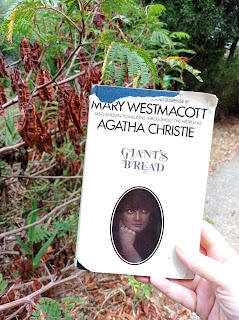
Vernon Deyre is a sensitive and brilliant musician, even a genius, tormented and driven by forces even he didn't understand. His sheltered childhood in the home he loves has not prepared Vernon for the harsh reality of his adult years, and in order to write the great masterpiece of his life, he has to make a crucial decision with no time left to count the cost. But there is a high price to be paid for his talent, especially by his family and the two women in his lifee - the one he loves and the one who loves him.
Young Nell Vereker had always loved Vernon, loved him with a consuming passion that was alien to the proper social world in which she lived. But when Vernon sought solace in the arms of Jane Harding, a stranger and enigmatically beautiful older woman, Nell felt she could endure no greater pain. But Fate had only begun to work its dark mischief on this curious romantic triangle -- for before their destinies were sealed, one would live, one would die, and one would return from the grave to be damned…
MY THOUGHTS:
This is my first Mary Westmacott novel, Agatha Christie's pseudonym when she wanted to depart from crime to try her hand at a more reflective, psychological genre. My mum had this one on her shelf among all her Agatha Christie mysteries, so I thought, 'Why not give it a go?'
It's the story of Vernon Deyre, (no clue about the pronunciation of his surname. I kept imagining something like Dyer or Dayer), an experimental young composer with some rudimentary genius. The 'giant's bread' alluded to in the title is his formative experiences, beginning in early childhood, to shape him into the man he becomes.
Vernon begins life as a deep and sensitive child; the pawn his smothering mother uses against his philandering father. He detests music passionately without understanding why, dreading the prospect of a concert like a trip to the dentist. The sound of music seriously sickens him and he's terrified of grand pianos, which he likens to beasts with fierce teeth.
Vernon's paternal aunt pronounces him to be a Deyre all through, which is tough luck on him since they're 'never happy or successful.' She's essentially taking on the wicked fairy role and cursing the boy at the outset of his life.
When he's a young man, Vernon visits an avant-garde concert where it dawns on him that his childhood repugnance was simply because everyone was doing music all wrong! He'd love the opportunity to create some himself.
The crux of the story is a love triangle which offers some interesting psychological insights. Vernon loves Nell, who lusts for him but knows he won't be able to afford the lavish lifestyle she craves, at least not in the short term, because weird, edgy composers aren't the toast of the town. Jane, a level-headed singer who is older than the others, loves Vernon despite herself. I was pretty satisfied with how it all works out until the final three or four pages. Oh gosh, then Christie/Westmacott goes too far and turns the whole thing into an Ancient Greek Tragedy that makes me facepalm. What a farcical finish
But I recommend it anyway. Other than the abysmal ending, it's quite a page turner with some riveting twists and turns. There are other loved ones in Vernon's life too. His best buddy Sebastian is a wealthy Jewish boy who longs to take a chance on beautiful things, nurturing them to success with his financial backing. Sebastian is in love with Vernon's cousin Josephine, aka Joe, who won't consider him as a potential spouse because she's a passionate champion for the weak and oppressed, and he doesn't tick the box.
Food for thought comes thick and fast. For example, Jane discusses with Vernon the three qualifications a woman really needs to face a life of poverty. 1) A sense of humour 2) A tough hide, and 3) The valuable quality of being sufficient unto oneself. 'You'd be alright stuck down anywhere, Buckingham Palace or the Sahara,' she tells him, 'because you've got your mental preoccupation - music. But Nell is dependent on extraneous circumstances.' Hmm, are some people really unfit to be poor?
Sebastian's motto is always, 'I believe in beauty, in creation, in things like Vernon's music. I can't see any real defense for them economically, and yet I'm perfectly sure they matter more than anything else in the world.'
Overall, I quite like Vernon, who in spite of being so highly strung and swept by any breeze, never really does anything we can fault him for. (Whoa, perhaps that makes him the perfect Greek tragic hero after all!) It was fun and fast, and I'm inclined to just ignore the last few pages. Based on Giant's Bread, I'm willing to read some other Westmacott titles down the track.
🌟🌟🌟½
The Vince Review
I invite you to treat this blog like a book-finder. People often ask the question, "What should I read next?" I've done it myself. I try to read widely, so hopefully you will find something that will strike a chord with you. The impressions that good books make deserve to be shared.
I read contemporary, historical and fantasy genres. You'll find plenty of Christian books, but also some good ones from the wider market. I also read a bit of non-fiction to fill that gap between fiction, when I don't want to get straight on with a new story as the characters of the last are still playing so vividly in my head. ...more
- Paula Vince's profile
- 108 followers



